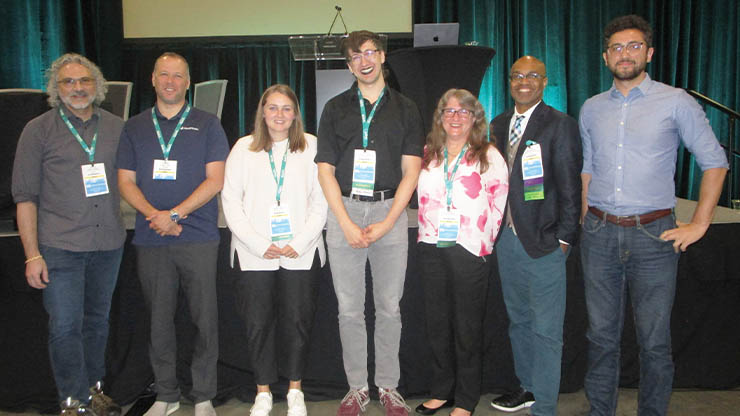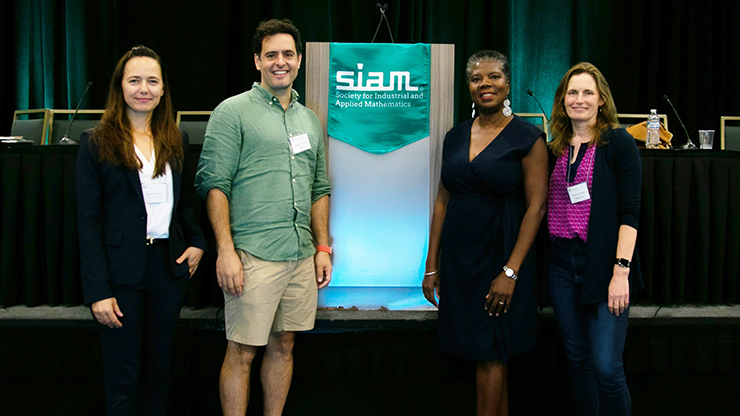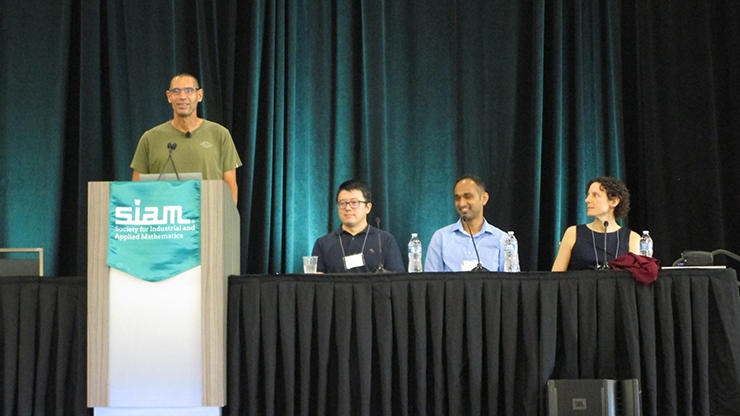MDS24 Panel Discussion Affirms the Importance of Early-career Mentorship
Mentorship is a critical component of both personal and professional growth in the fields of applied mathematics, computational science, and data science. As junior scientists prepare to enter the workforce, the guidance of more senior colleagues and advisors serves as a valuable resource. During the 2024 SIAM Conference on Mathematics of Data Science (MDS24), which is currently taking place in Atlanta, Ga., a panel of researchers from academia, industry, and the national laboratories spoke about their own perceptions of and experiences with mentorship. Robin Belton of Vassar College moderated the discussion, which featured insights from Mansoor Haider of North Carolina State University; Sulimon Sattari of Medical Informatics Corp.; Sarah Tymochko of the University of California, Los Angeles; and Stefan Wild of Lawrence Berkeley National Laboratory (LBNL). The panel, which was followed by an associated networking session, was part of the Broader Engagement activities and Mentoring Program at MDS24.
After the panelists introduced themselves, Belton asked each speaker to describe the types of qualities that mentors should exhibit. Wild affirmed that the best mentors are approachable and able to speak knowledgably about a wide variety of topics. They are also typically more senior than their mentees. “It’s helpful if they’ve experienced things that you’ll be experiencing in the future,” he said.
Sattari agreed, seconding the importance of mentors whose career trajectories at least somewhat align with one’s own. When transitioning from a postdoctoral position to industry, he sought impactful relationships beyond his established circle because all of his existing mentors were academics. “One thing that’s helped me is listening to the people who are where you want to be,” Sattari said. “You need mentors to point you in the direction that you want to go, not in the direction that they want you to go.” He recommended LinkedIn as a good place to make new acquaintances, as users—many of whom have mutual connections—routinely post about specific research topics and needs. In some cases, existing advisors may even be able to introduce their mentees to new contacts.

Despite the value of common interests, Haider explained that mentors who do not work in one’s narrowly specific research area can offer unbiased advice about certain situations. Wild concurred, offering a firsthand example. When considering a cross-country move from Argonne National Laboratory to LBNL, he found that he couldn’t talk to his prospective colleagues at LBNL or his current associates at Argonne, as both had a personal stake in the matter. As such, he consulted objective parties who had experienced equally significant career moves. “It’s helpful to have a mentor outside of your immediate sphere, someone who is a little bit at arm’s length because they can give you a different perspective,” he said. Based on such guidance, he chose to relocate his family to LBNL.
Tymochko appreciates openness and honesty in her mentors. She spoke highly of her Ph.D. advisor at Michigan State University, who took a personal interest in her students, routinely asked about their wellbeing, and shared personal anecdotes about her own successes and failures. “My favorite part of working with her is that she really treated us like human beings,” Tymochko said. “It’s helpful to see that people you look up to have flaws and have gone through things. She’s a person I can talk to about anything, not just research.”
As an early-career researcher who is currently on the job market, Tymochko counsels undergraduate students but still routinely seeks guidance from her postdoctoral advisor. She urged attendees to communicate with their advisors and let their them know when they are confused and need additional direction. “I don’t know how to help if I don’t know what the question is,” Tymochko said. “Be open and willing to learn and admit when you’ve done something wrong or made a mistake.” In response, she attempts to show her mentees that she values their time by giving them her undivided attention during meetings and check-ins.
Haider similarly appreciates when his mentees speak up and let him know if something is amiss, either personally or professionally. This kind of feedback allows him to adjust his approach accordingly. “Everyone is different, so my approach has been different for every single student,” Haider said. “You need to learn about their personalities and adapt. Good communication in both directions really helps a lot.” For instance, some students are quick to vocalize their confusion or dissatisfaction, while others are more timid and respond poorly to constructive criticism.
To avoid communication issues, Wild advised all mentees to clarify their expectations for the mentor-mentee relationship. “Don’t be afraid to ask for a lot,” he said. “In my experience, people are more generous with their time than you’d think. Our community is really good in that way, so don’t be afraid to take some chances and start some new relationships.”

One of the best pieces of advice that Tymochko has received is just to be herself, especially when applying to jobs. “You don’t want to go somewhere where people are thinking you’re something that you’re not,” she said. “You’ll get a lot further by being honest.” She likewise encouraged job seekers to refrain from overcomplicating their research in an effort to sound impressive; clear, effective communication is almost always more impactful than self-aggrandizement.
To expand upon the topic of information exchange, Haider suggested that all researchers—regardless of employment area—maintain some form of ongoing documentation to keep track of tasks and projects and avoid any potential misunderstandings. Wild agreed, listing platforms like Overleaf, Google Docs, Jupyter Notebooks, and Slack as possible candidates. He is partial to Overleaf and keeps a running Overleaf document that serves as a “no-judgment zone,” where team members can record ideas and unabashedly ask for help. This type of approach is a particularly useful way to check in with students and ensure that they are on the correct path.
Haider also recommended that students focus on their writing proficiency, as writing is a critical skill in graduate school and beyond. “Great mentees take writing seriously, he said. “Students may underestimate the importance of writing, so there’s a huge variability in people’s writing ability when it comes time to work on their theses.”
As the panel drew to a close, Haider admitted that most mentors experience at least some form of imposter syndrome. Wild urged participants to trust their own capabilities and know that even the least senior person has something to offer; early-career scientists can mentor Ph.D. students, Ph.D. students can mentor undergrads, undergrads can mentor high school students, and so forth. “You’re never going to think that you’re ready to be a mentor,” Wild said, but told participants to do so anyway. “People at all career stages are always working to figure things out.”
About the Author
Lina Sorg
Managing editor, SIAM News
Lina Sorg is the managing editor of SIAM News.

Stay Up-to-Date with Email Alerts
Sign up for our monthly newsletter and emails about other topics of your choosing.






